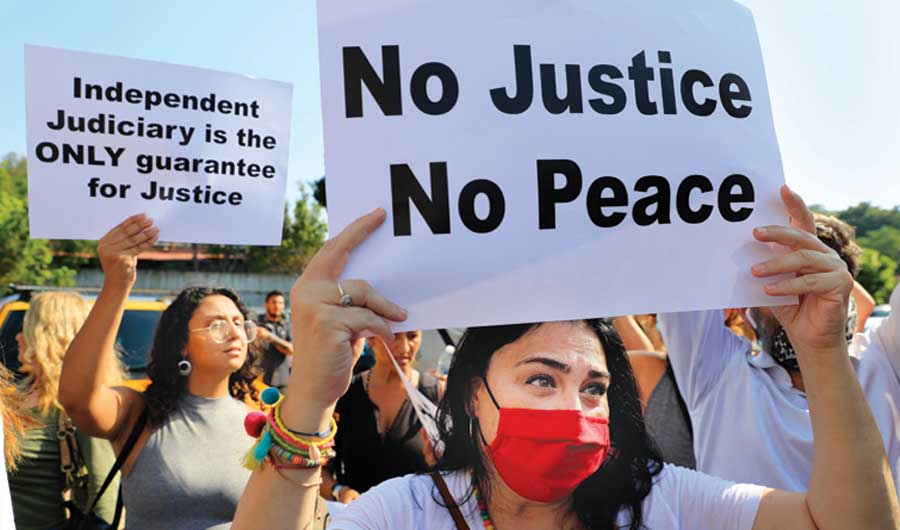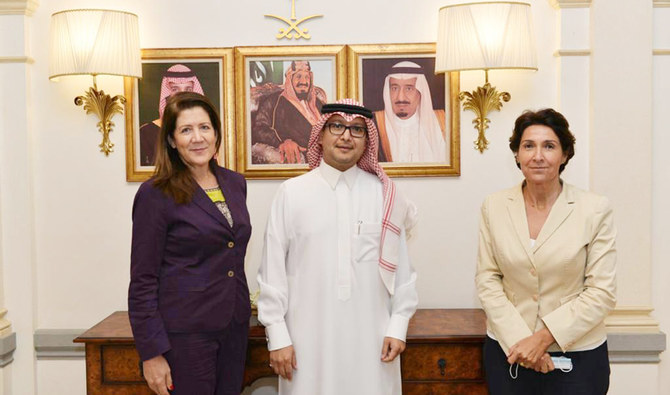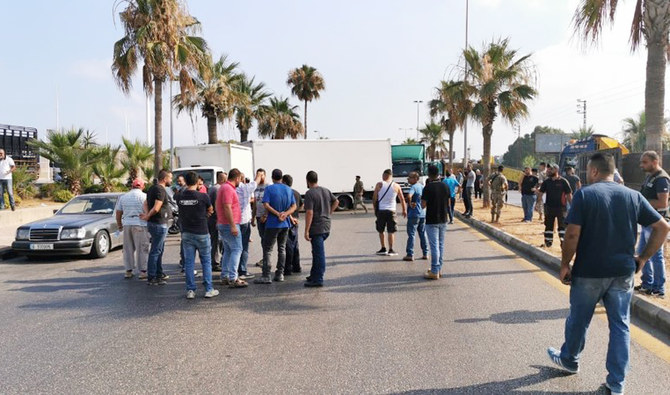BEIRUT: The EU’s foreign policy representative, Josep Borrell, is expected to visit Lebanon on Tuesday and meet officials.
Borrell said that “the situation in Lebanon has not improved” since his last visit to the country three weeks ago.
On Monday, the EU Foreign Affairs Council discussed the Lebanese crisis.
German news agency DPA said that the council might officially approve the adoption of sanctions against Lebanese officials considered to be undermining democracy in the country.
But the agency added that EU diplomats “are divided over the possibility of adopting sanctions, as a result of many outstanding technical and judicial points.”
Meanwhile, a diplomatic meeting was held in Beirut between the Saudi Ambassador to Lebanon Walid Abdullah Al-Bukhari, US Ambassador Dorothy Shea and French Ambassador Anne Grillo.
The meeting at the Saudi Embassy comes days after meetings between the US and French envoys in Riyadh with Saudi officials to develop a joint action plan for humanitarian and food assistance to Lebanon.
The US and France are seeking to motivate the provision of aid to Lebanon to protect stability and the Lebanese Army, in light of two separate statements issued last week by the American and French embassies in Lebanon.
The diplomatic efforts have ramped up amid the acceleration of the economic collapse in Lebanon and the fear that the situation could descend into chaos.
US Secretary of State Anthony Blinken, French Foreign Minister Jean-Yves Le Drian and Saudi Foreign Minister Faisal bin Farhan discussed the crisis last month in Italy on the sidelines of the G20 summit in Matera, Italy.
Blinken tweeted: “Important discussion with my Saudi and French counterparts, @FaisalbinFarhan and @JY_LeDrian, regarding the need for Lebanon’s political leaders to show real leadership by implementing overdue reforms to stabilize the economy and provide the Lebanese people much-needed relief.”
In a statement issued after the tripartite meeting, the Saudi Embassy said that the discussions “focused on the most prominent political developments taking place in the Lebanese and regional arenas, in addition to issues of common interest.”
The US Embassy tweeted that the diplomatic consultations focused on “the dire economic situation in Lebanon and how to most effectively support the Lebanese people.”

Supporters of families who had relatives killed in last year’s blast at Beirut’s port, take part in a protest in support of legal action, near the blast scene on Monday. (AP)
The talks took place as the Banque du Liban (BDL) denied rumors that the central bank’s governor, Riad Salameh, had disposed of the bank’s gold.
The BDL reassured that “Lebanon’s gold is fine, untouched, and will not be touched.”
The bank added that the gold “is not subject to any pawn or pledge, as some may dream, intending to continue to drown Lebanon and harness what the country still owns for goals that harm Lebanon and do not serve its interests at all.”
The BDL stressed that it “will also maintain the mandatory reserve.”
It said “the solution to reviving the Lebanese economy is for political officials to assume their responsibilities in forming a new government that will implement the required reforms and restore confidence internally and externally.”
Lebanon is witnessing the worst economic crisis in its modern history.
The national currency lost more than 95 percent of its value against the dollar, which touched LBP 20,000.
This has resulted in the loss of purchasing power and to problems that extend to the loss of electricity, medicine, fuel and foodstuff, for which subsidies are being lifted because of the scarcity of foreign currencies.
The Health Ministry has meanwhile announced an investigation into the death of a baby girl whose family said she was unable to access proper treatment amid Lebanon’s severe medical shortages.
Juri Al-Sayed died on Sunday aged just 9-months-old in the southern town of Anout from pneumonia. It was alleged that the hospital lacked the medicines required to treat the infection. She suffered from very high temperature. Baby Juri was transferred to a hospital that lacked the requisite paediatric care.
The tragedy constituted a new source of simmering anger among the Lebanese.
On Sunday and Monday, many activists, including doctors, announced on social media their intention to emigrate “because the state is killing its own people.”
Hamad Hassan, the health minister in the caretaker government, met with a delegation from the Syndicate of Pharmaceutical Importers and owners of drugstores in Lebanon.
A member of the syndicate’s board of directors, Marwan Hakim, said: “The importers suffer from financial technical problems related to the transfers that the BDL must issue to companies abroad, as these transfers have stopped since May 7.”
Hakim said: “If the problems are not resolved, there will be no medicine left in Lebanon.”
Pharmacies returned to work on Monday after an open strike that lasted for days despite not achieving their goal of an improved availability of medicine in pharmacies.
A statement from their group said pharmacists might strike again if the health minister did not meet the commitments.
It added that the pharmacists were awaiting the minister’s “fulfillment of his pledge to issue detailed regulations for medicines based on the agreement between the ministry and the BDL.”
This agreement is expected to allow importers to release and distribute medicines to pharmacies, especially those that treat chronic diseases, inflammatory medicines and pain relievers.





































